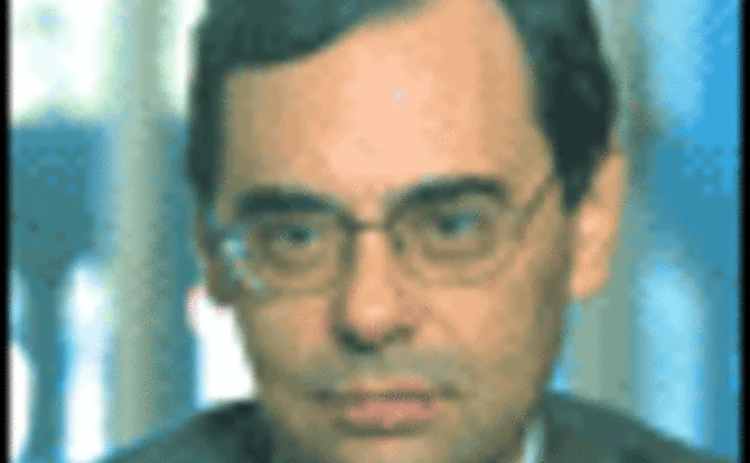
The poet of risk regulation
Jaime Caruana has been seeking harmony in his role as chairman of the Basel Committee on Banking Supervision. Now that the final text of the new Basel Accord has finally been released, Caruana can comment on the work he has done – and give his views on the preparedness of Spanish banks.

Central bankers are not expected to be conversant with the works of poets. But in a banking conference held in July in Madrid, Jaime Caruana, the chairman of the Basel Committee on Banking Supervision and governor of the Bank of Spain, quoted a passage from the poet TS Eliot, in presenting the hardships confronting the supervision committee over the implementation of the new Basel Capital Accord: “What we call the beginning is often the end. And to make an end is to make a beginning.” Such literary references are perhaps surprising from a man with such a sober reputation.
Gaining an interview with Caruana is not the easiest of tasks. Considering the enormous pressures of one of the most crucial jobs in the banking regulatory sector, this is understandable. Basel II has been the subject of comment, criticism and discussion ever since its announcement in the first consultation paper in 1999.
Finding a harmonious solution for the entire banking community’s risk management needs has not been easy, and there have been several delays on the implementation date. But, with the publication of the final draft of the regulations last July, the Basel II negotiations finally seem to be drawing to some kind of a conclusion. Caruana is happy with the outcome.
“I am quite satisfied with the text,” he says. “The Basel II framework released in June represents the culmination of nearly six years of hard work and extensive consultations worldwide. I don’t expect fundamental changes to the construct of the framework.”
Caruana may not have been the originator of the new Basel Accord – that title falls to his predecessor William McDonough, whom he replaced as chairman of the Basel Committee in May 2003 – but, with the release of the final draft, he has steered it to its major staging point. Now all that is left is the implementation.
Caruana has pointed out that the Basel II text takes a more flexible approach to capital supervision than the static rules laid out in the 1988 Accord, in anticipation of any ongoing potholes that the committee may have to navigate. But pleasing everyone has continued to be a very difficult task, and there are a number of issues still to be resolved (Risk August 2004).
One of the most contested points has been the staggered implementation dates of the new Accord, with the advanced internal ratings-based (IRB) approach being implemented a year later than the simpler approaches to credit and operational risks, which come into force at the end of 2006.
“It has been said that haste makes waste,” says Caruana. “In the case of Basel II’s advanced approaches, none of us will benefit from an overly hasty implementation if our systems are not sufficiently ready for actual use as risk management tools.”
He admits that, for the advanced IRB approach, there is still more work to be done. And the committee is currently dealing with specific issues such as the treatment of “double default” and trading book risk.
“We have already begun this work jointly with the International Organization of Securities Commissioners (Iosco), and would like to incorporate our efforts into the Basel II framework as soon as possible,” says Caruana. “In the case of double default in particular, we have made a commitment to seek a prudentially sound solution as promptly as possible prior to implementation.”
Caruana says the national field tests being carried out under the QIS 4 studies in certain countries – together with the parallel capital calculations countries are required to run during transition to the new rules – will help the committee review its objectives for the new framework.
“Should we determine that our objective will not be achieved, we are prepared to address the situation,” says Caruana.
Scaling factor
Should the new framework fall short of maintaining broadly the aggregate level of required capital in the banking system, the committee may decide to apply a single scaling factor to the capital charges that arise from the IRB approach to credit risk.
“This would be preferable to making last-minute changes to the IRB approach, as late changes to the fundamental construction of the capital requirement could be disruptive to banks’ efforts to prepare for its implementation,” he says.
As chair of the committee, Caruana has aimed to achieve a balance between the differing interests of the parties involved – banks, national regulators, other regulatory standard-setters – rather than having a blanket approach.
“The ‘balance’ we want in Basel II is between consistency and risk-sensitivity,” says Caruana. “Basel II provides national authorities with a menu of choices for the treatment of credit and operational risk.”
The Committee also has aimed to work in close co-operation with the International Accounting Standards Board to align the risk and accounting reporting standards. Though harmony has been difficult to achieve, Caruana is confident that it is closer than ever before.
Spanish connection
Away from his Basel commitments, Caruana has been wrestling with issues relating to the Spanish market in his role as the governor of the Bank of Spain.
Caruana made his way through the ranks of the Spanish Ministry of Trade before holding positions on the Spanish Treasury and as a member for Spain at the European Union Monetary Committee. He joined the Bank of Spain in 1999, becoming governor the following year.
This extensive experience, as well as the work he has done with the Basel Committee, puts him in a good position to speak on the diverse issues in the Spanish market. One area of concern has been the Spanish mortgage business, which has seen huge increases in the volume and types of mortgages being sold.
While this poses potential problems for individual mortgage holders, for example in a rising interest rate environment, Caruana says it is not such a big risk for the institutional banking sector because of the healthy position of Spanish credit institutions. He says banks are mindful of the potential risks involved with the growth of the mortgage market and are offering instruments to restrict and control them, such as interest rate caps.
The other major issue under scrutiny is regulating the development of Spain’s derivatives business. Spain has been somewhat slow to adopt some of the techniques seen in other countries, synthetic securitisation for instance.
“Products such as credit derivatives have captured the interest of Spanish banks, but in a more gradual manner than in other countries,” says Caruana. “The banks are generally being cautious, while most Spanish institutions are buying protection, rather than selling such products.”
Market participants say the market has been stunted because of the tight, heavy-handed regulatory system in place – investment funds in Spain are still not able to invest in synthetic securitisations, and new laws allowing this have been delayed for nearly a year.
Liberal approach
Caruana says he favours a more liberal approach to regulation. “The Bank of Spain is aware of the complexity associated with instruments – such as structured securitisations or certain credit derivatives – used in risk transfer processes,” he says. “But we try not to interfere in financial innovation processes, particularly not in a setting such as that in Spain where credit institutions and the markets themselves have acquired a sufficient degree of maturity.”
Furthermore, he says, investors who freely choose to enter sophisticated markets must also bear some responsibility for their actions, though banks should be active in better educating the investor. But Caruana believes the new Basel II framework, which sets out the specific treatments for securitisation and credit risk mitigation, should promote the credit derivatives business in countries such as Spain in a way that is compatible with sound risk management practices.
Caruana is positive about the risk management and measurement capabilities of Spanish banks, which have improved over the past few years partly as a response to the growing complexity and diversification of banking business.
“I am fully convinced that this improvement in the state-of-the-art of risk management will be significantly boosted by Basel II,” he says. “And Spanish banks will continue making the efforts needed for the successful implementation of the new capital framework.”
But given the stringent requirements that must be met to access the most sophisticated methodologies of Basel II, he anticipates that only the leading banks will be in a position to access the most advanced approaches in the initial period.
Juggling two of the most important roles in banking supervision may not leave much time for poetry, but Caruana has displayed a rigorous capacity for organisation that would leave some poets stumped.
Only users who have a paid subscription or are part of a corporate subscription are able to print or copy content.
To access these options, along with all other subscription benefits, please contact info@risk.net or view our subscription options here: http://subscriptions.risk.net/subscribe
You are currently unable to print this content. Please contact info@risk.net to find out more.
You are currently unable to copy this content. Please contact info@risk.net to find out more.
Copyright Infopro Digital Limited. All rights reserved.
As outlined in our terms and conditions, https://www.infopro-digital.com/terms-and-conditions/subscriptions/ (point 2.4), printing is limited to a single copy.
If you would like to purchase additional rights please email info@risk.net
Copyright Infopro Digital Limited. All rights reserved.
You may share this content using our article tools. As outlined in our terms and conditions, https://www.infopro-digital.com/terms-and-conditions/subscriptions/ (clause 2.4), an Authorised User may only make one copy of the materials for their own personal use. You must also comply with the restrictions in clause 2.5.
If you would like to purchase additional rights please email info@risk.net
More on People
People: You’re fired! US agency rejig, new CROs at ING, StanChart, and more
Latest job changes across the industry
SocGen’s PB clearing head departs for SwapAgent role
Jamie Gavin takes external consulting role for LSEG’s non-cleared swaps platform
Robertson leaves Barclays’ prime services in New York
Head of prime derivatives services unit departs after seven years with the bank for Carbon Point
Citadel Securities hires former Eisler CRO
Pregnell joins market-maker after demise of hedge fund
People: Fishwick hands over BlackRock CRO role, Citi expands Asia FX team, and more
Latest job changes across the industry
Nomura shuffles risk methodology team
Epperlein takes advisory role six months after Japanese bank’s FRTB IMA go-live
Andy Ross leaves StanChart
CurveGlobal veteran confirms his departure as bank’s global head of prime brokerage
People: BofA’s new markets heads, Barclays takes SG’s Mastrangelo, and more
Latest job changes across the industry







